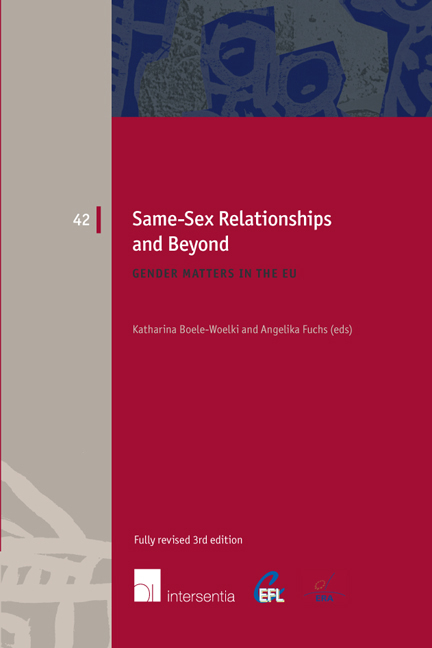Book contents
- Frontmatter
- Preface
- Contents
- List of Authors
- Part I Formalising a Same-Sex Relationship: Marriage and Partnership
- Northern Europe: Same-Sex Relationships and Family Law
- Legal Recognition of Same-Sex Relationships in Central Europe: Steady Progress
- Southern Jurisdictions: Consolidation in the West, Progress in the East
- Same-Sex Partnerships in Eastern Europe: Marriage, Registration or No Regulation?
- Part II Parenthood and Children's Rights
- Part III Gender Identity and Human Rights
- EUROPEAN FAMILY LAW SERIES
Same-Sex Partnerships in Eastern Europe: Marriage, Registration or No Regulation?
from Part I - Formalising a Same-Sex Relationship: Marriage and Partnership
Published online by Cambridge University Press: 29 September 2018
- Frontmatter
- Preface
- Contents
- List of Authors
- Part I Formalising a Same-Sex Relationship: Marriage and Partnership
- Northern Europe: Same-Sex Relationships and Family Law
- Legal Recognition of Same-Sex Relationships in Central Europe: Steady Progress
- Southern Jurisdictions: Consolidation in the West, Progress in the East
- Same-Sex Partnerships in Eastern Europe: Marriage, Registration or No Regulation?
- Part II Parenthood and Children's Rights
- Part III Gender Identity and Human Rights
- EUROPEAN FAMILY LAW SERIES
Summary
INTRODUCTION
If some decades ago marriage represented the only legally recognised and regulated partnership, today one cannot claim the same any longer. Thus, in individual states, the number of cohabitations also including more or less widely same-sex partnerships has notably increased. The various regulations differ, as on the one hand there are states emphasising a traditional partnership relation (therefore, marriage), and then there are states recognising and legally regulating same-sex partnerships in a certain way, and deriving from this rights and obligations (e.g. by registration or by de facto living community). The third group is composed of states making marriage available to same-sex partners and thereby totally equalising them with spouses.
All Eastern European countries (Slovenia, Croatia, Hungary, Czech Republic, Slovakia, Poland, Estonia, Latvia, Lithuania, Bulgaria and Romania) have common roots. They were part of communist and socialist systems. Therefore, in the last 25 years, all Eastern European countries have been faced with political changes, new legislation, transitional problems. In many of them, religion still plays a very important role in everyday life and also in relation to legal questions or regulation of same-sex partnerships. Marriage as ‘traditional value and partnership relation ’ is in some countries still very strongly represented. But we cannot overlook the fact that in some Eastern European countries the majority of children are born outside wedlock: for example, in Estonia (59.7 per cent), Slovenia (56.8 per cent), Bulgaria (56.1 per cent), and Latvia (44.6 per cent). On the other hand, Croatia (16 per cent), Poland (21.2 per cent) and Lithuania (30 per cent) are the Eastern European countries with the lowest rate of children born outside wedlock.
In all Eastern European countries, there have also been many discussions, incentives and in some countries also constitutional referendums regarding the legal position and regulation of same-sex partnerships. In Eastern European countries, debates mostly concern the relation of ‘traditional marriages and families’ or ‘ modern non-traditional marriages and families’. And this is the difference with respect to the Western European countries, which in the last two decades have taken significant steps to improve the legal protection and rights of same-sex couples.
- Type
- Chapter
- Information
- Same-Sex Relationships and BeyondGender Matters in the EU, pp. 55 - 76Publisher: IntersentiaPrint publication year: 2017
- 1
- Cited by



